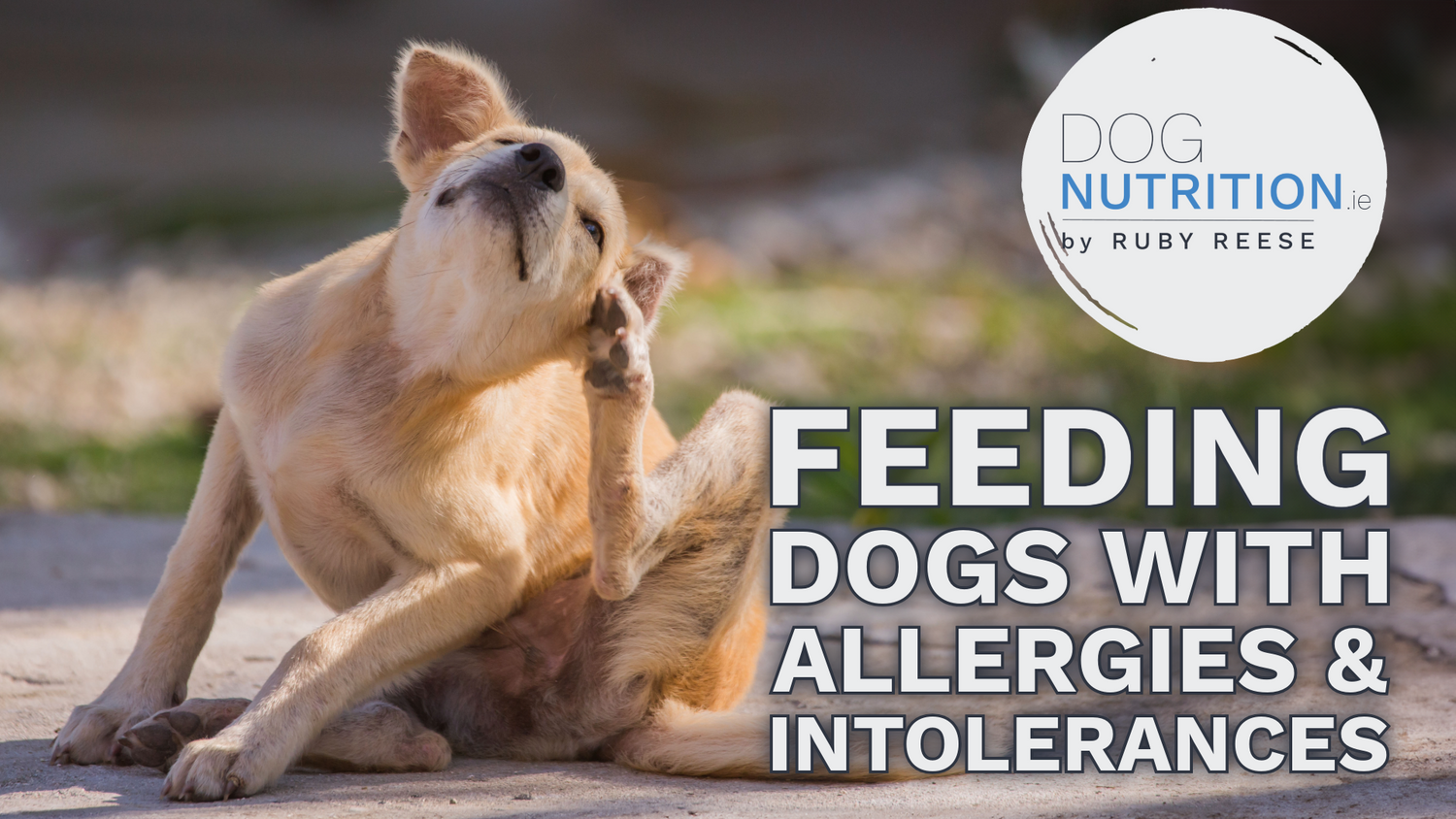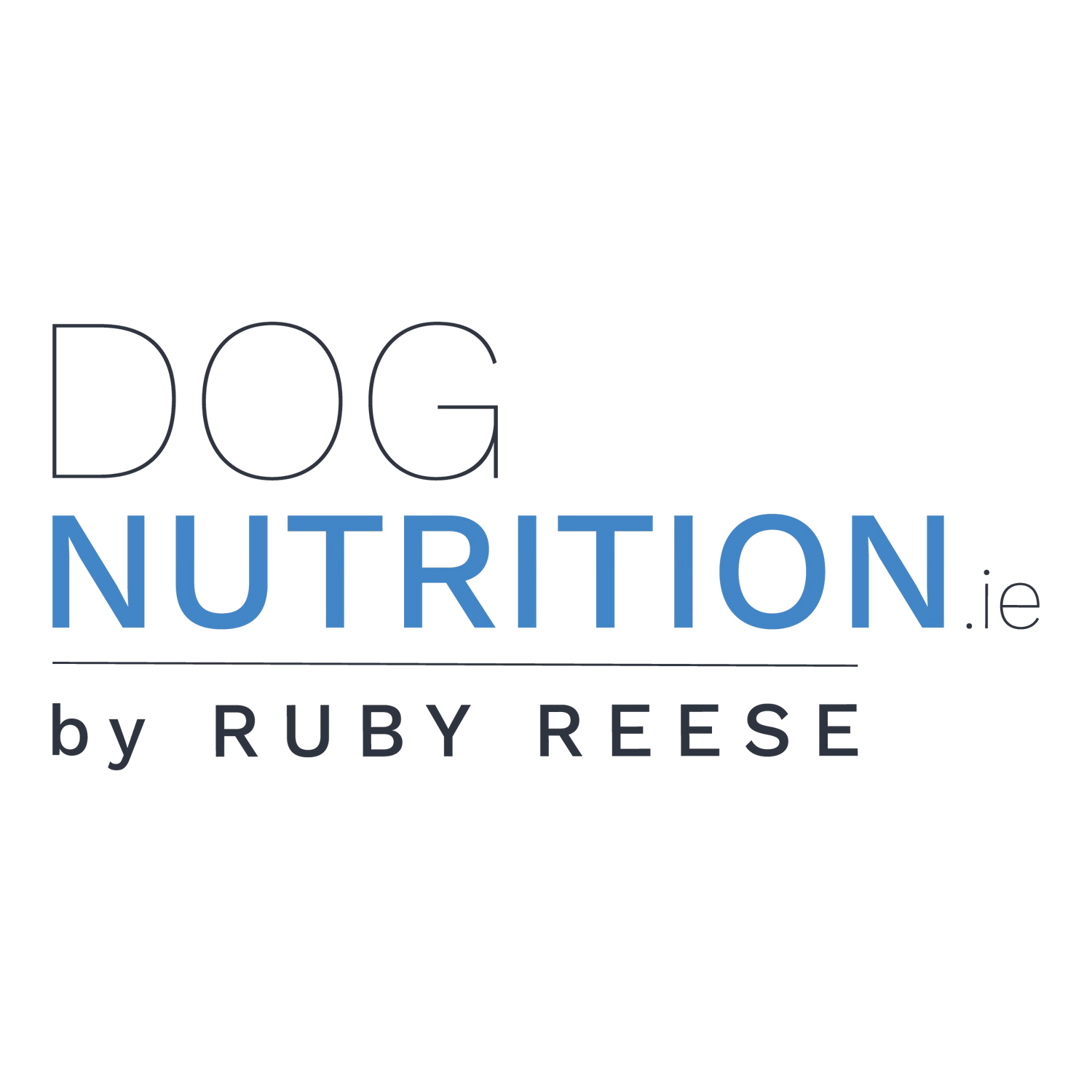Why Consulting a Canine Nutritionist Can Benefit Dogs with Allergies and Intolerances
It’s heartbreaking to watch a dog constantly scratching, licking their paws, or suffering from recurring ear infections and digestive upset. These are common signs of food allergies or intolerances, conditions that can turn mealtime into a stressful guessing game.
For pet guardians, navigating the world of dog food labels, limited-ingredient diets, and online advice can feel overwhelming. While veterinarians play a crucial role in diagnosing and ruling out medical causes, a canine nutritionist can provide specialised guidance and design diets that clearly identify and remove triggers, reduce symptoms, and support long-term health.
In this article, we’ll explore what food allergies and intolerances are, why nutrition is such a powerful tool in managing them, and how a canine nutritionist can help create clarity in what often feels like a confusing and frustrating process.
Understanding Allergies vs. Intolerances
Though often used interchangeably, allergies and intolerances are not the same thing:
- Food allergies: Involve an immune system reaction to a specific protein (such as chicken, beef, or dairy). Even tiny amounts of the allergen can trigger symptoms and they will trigger them every time the allergen is ingested. Common signs include: itchy skin and excessive scratching, ear infections or chronic ear inflammation, red or inflamed skin, hot spots or rashes, gastrointestinal upset (vomiting, diarrhoea, bloating) and paw chewing or licking
- Food intolerances: Do not involve the immune system but occur when a dog has difficulty digesting certain ingredients (like lactose or high-fat foods). Symptoms are usually digestive - gas, diarrhoea, or upset stomach.
Here is our blog post on why saliva and hair lab tests are not suitable for diagnosing an allergy or intolerance.
Unreliable Testing
Allergy tests for dogs using saliva or fur samples are not considered reliable or suitable for diagnosis of allergies by the scientific community. The major problem with these unreliable test results is that owners trust their validity and this often leads to the real issue remaining unsolved.
Allergy test carried out on blood samples or scratch tests done by your vet can offer a direction for an elimination diet (identify a protein source your dog is unlikely allergic to). Such tests are not able to identify what your dog is allergic to and the course of actions (i.e. elimination diet) stays the same.
Why Diet Is So Important
Unlike some health conditions, food-related allergies and intolerances can’t be “cured” with medication alone - the offending ingredient must be removed from the diet. Nutrition is therefore both the cause and the solution.
The goals of dietary management include:
- Identifying and eliminating problem ingredients.
- Providing a nutritionally complete diet that avoids allergens.
- Supporting skin and gut health through balanced nutrients.
- Improving comfort, reducing flare-ups, and restoring quality of life.
But finding the right diet can be difficult without expert guidance, which is why many pet parents turn to a canine nutritionist.
How a Canine Nutritionist Can Help
Canine nutritionists, like Chris at dognutrition.ie, who have completed advanced courses for allergies & intolerances, specialises in formulating diets to support dogs with medical and lifestyle needs. For allergies and intolerances, they provide structured, evidence-based guidance to remove the guesswork.
Here’s how they make a difference:
1. Guidance on Elimination Diets
The gold standard for diagnosing food allergies is an elimination diet trial. This involves feeding a novel protein or hydrolysed diet for at least 8 weeks while removing all other food sources (treats, chews, scraps).
A nutritionist helps by:
- Selecting appropriate novel proteins that your dog hasn’t ever eaten before.
- Designing balanced elimination diets for home preparation if you prefer fresh feeding.
- Teaching strategies to maintain consistency during the trial (e.g., finding safe treats).
- Interpreting elimination diet results and guiding ingredient reintroductions to pinpoint allergens.
This structured approach prevents wasted time and frustration.
2. Designing Long-Term Allergen-Free Diets
Once trigger ingredients are identified, the next challenge is maintaining a safe, balanced and individualised diet. Simply avoiding chicken or beef may not be enough - hidden ingredients, cross-contamination, and nutrient imbalances can affect an allergic dog’s wellbeing.
A nutritionist ensures that your dog’s ongoing diet is:
- Free from known allergens while still meeting all nutrient needs.
- Balanced with the right levels of protein, fat, vitamins, and minerals.
- Practical and palatable so your dog actually enjoys mealtime and your household is comfortable with the feeding style chosen
3. Addressing Digestive Health and Gut Support
Dogs with food intolerances often have sensitive digestive systems. Nutritionists can:
- Recommend highly digestible ingredients to reduce stress on the gut.
- Incorporate fibre sources to regulate stool quality.
- Suggest supplements like omega-3 fatty acids or probiotics to support skin and gut health.
This comprehensive approach improves comfort beyond just removing allergens.
4. Navigating Commercial Diets and Labels
The pet food aisle is crowded with “hypoallergenic,” “grain-free,” and “limited ingredient” claims. But not all diets marketed this way are truly appropriate for dogs with allergies.
A canine nutritionist helps by:
- Evaluating commercial diets for hidden ingredients or cross-contamination risks.
- Identifying trustworthy brands whose ingredients match their claims.
- Teaching you how to read labels critically and spot red flags.
This saves time, money, and lots of frustration.
5. Creating Safe Home-Cooked and Raw Recipes
For some dogs, commercial diets don’t cut it - or pet owners simply prefer to prepare meals at home. But balancing home-cooked and raw diets for dogs with allergies can be tricky without expert input.
A nutritionist can:
- Provide precise recipes that avoid allergens.
- Recommend supplements to fill any gaps in homemade diets.
- Adjust recipes over time as your dog’s condition or preferences change.
This way, you can enjoy the control of home feeding without risking nutrient deficiencies.
6. Supporting Complex Cases
Allergies and intolerances don’t always occur in isolation. Some dogs also have:
- Chronic ear or skin infections
- Digestive or gut problems
- Concurrent health conditions like kidney disease or obesity
A canine nutritionist can collaborate with your vet to create a plan that balances all these factors, ensuring nutrition supports the whole dog.
Benefits for Pet Owners
Working with a canine nutritionist doesn’t just help your dog - it helps you, too. Pet parents often find relief in:
- Clarity: No more trial-and-error guessing games with food.
- Peace of mind: Confidence that the diet is safe and balanced.
- Simplicity: Guidance in choosing safe treats, chews, and supplements.
- Support: Someone to turn to with your questions and provide clarity.
Instead of feeling lost in a maze of food choices, you’ll have a clear, professional plan tailored to your dog.
Practical Tips for Getting Started
If you’re considering consulting a canine nutritionist for allergies or intolerances, here’s how to prepare:
- Talk to your veterinarian. Rule out underlying medical causes for the symptoms
- Book your appointment with a certified canine nutritionist at dognutrition.ie
- Collect diet history. Bring a detailed list of everything your dog has eaten (including treats and table scraps).
- Be patient. Trust the process, a few strict weeks can lead to so much clarity for the rest of their lives.
- Stay consistent. Even small exposures to allergens can derail progress.
- Keep communication open. Share updates with nutritionist to fine-tune the plan. At dognutrition.ie we build in 8 weeks of support as standard to our Nutrition Plan Plus, which is the plan most suitable for working with a food allergy case.
Final Thoughts
Allergies and intolerances can make feeding your dog stressful, but with the right support, they are very manageable. Nutrition is both the problem and the solution - and it’s where you, as a pet parent, can make the biggest difference in your dog’s comfort and health.
By consulting dognutrition.ie, you gain an expert partner who can guide elimination trials, design allergen-free diets, and support your dog’s overall well-being. Combined with veterinary care, this creates a comprehensive approach that helps your dog thrive - without the constant itching, discomfort, or digestive distress.
For pet guardians, that means peace of mind, clarity, and the joy of seeing your dog happier, healthier, and more comfortable in their own skin.




0 comments